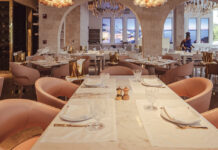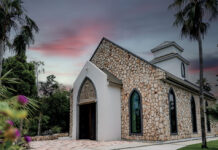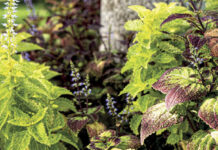Choosing finishes for the many components inside a home can be a difficult task. Just ask the proud owner of a newly built or renovated home.
Unless a homeowner is particularly creative, undertaking this task without the guidance of a qualified interior designer can tempt one to go the safe route and only choose finishes that are considered standard. While there is nothing wrong with that, there are myriad creative and interesting options available, allowing you to inject personality into your home, add value, and set your space apart from the others.
The usual suspects aside, (granite counter tops, porcelain and ceramic tiles, timber floors, etc); there are many finishes available on the market today with which you can have some fun.
Concrete
Ever a favourite in the Caribbean for its reasonably ‘hurricane-proof’ characteristics, concrete is so much more than a construction material to be hidden from view. It’s making its way into kitchens, bathrooms, living rooms and offices, and being fashioned into everything from sinks and countertops to furniture. It is completely versatile allowing endless options for shape, size, colour, style and texture; it can be personalised by inlaying tiles, personal items or fossils; it can be polished to reveal embedded rocks, sand or coloured glass; and it can look ultra contemporary or old and rustic as if it were 2,000 years old, and everything in-between.
Concrete is a natural product and therefore susceptible to staining and chipping, although chips are easy to repair and almost undetectable once fixed. By using an appropriate sealant concrete becomes virtually stain-proof.
It’s important to note that concrete is heavy. Check whether your substrate requires additional support – i.e. cabinets beneath a concrete counter may need extra reinforcement.
Wallpaper
Once out of favour, wallpaper has made a serious comeback. There are an infinite number of designs available on the market, made even more interesting by technological innovations allowing paper designers free rein with only their imagination holding them back – from metal and mother of pearl to good old fashioned patterned paper.
A favourite at IDG is glass beaded wallpaper with which you can do almost anything; a solid colour, a pattern, or you can supply your own image and have it imposed on the paper for a custom masterpiece.
The beauty of today’s wallpaper is that it’s completely adaptable and can be used on columns, ceilings, furniture insets, display cases and, of course, walls. Paper an entire room, including the ceiling, for serious impact. Or for a more subtle approach, paper just one wall in the room.
Consider the location of your intended application and check that the composition of the paper is suitable, for example avoid woven grass papers in steamy bathrooms.
Glass and mirrors
One of the advantages of both glass and mirror is that they can blend very well with other types of materials and help create a bright and airy atmosphere. Well positioned glass, or mirror, can have a significant impact in smaller areas by creating the illusion of space and enhancing the available light.
Glass in particular is a multifaceted product that has many uses, and does not have to be completely clear or colourless. It can take many forms including etched, frosted, fused colour (opaque or transparent), metallic colours, textured, inter-layered with mesh/natural fibres/veneers/metals – you get the idea.
Think outside the box with both of these products, for example rather than a standard hinged door for your bathroom, install a frosted glass sliding panel with the word “bathroom” stencilled in clear glass (or any other word/poem/quote that you like). Or consider a mirrored backsplash in your kitchen, adding a sense of depth that is easy to maintain.
Be cautious when considering mirror placement–they can be unappealing when reflecting a blank wall or unattractive furniture and can cause unnecessary glare in a room.
Leather
Thanks to ingenious product designers, we need no longer be wary of using leather in the home. Many leathers are now practical (water, stain and fade resistent) and workable through careful selection of hides and the use of aniline dye (water based) and pigment (oil based).
There are some exquisite leather products available that can be incorporated into almost any design. Create a custom headboard with woven leather, wrap interior doors in embossed leather with a nail-head trim, or keep it simple by applying textured leather tiles to a wall in the home.
Be aware: leather isn’t for everyone, but used in an appropriate way it should patina beautifully and last a lifetime.
As Teddy Edelman, founder of Edelman Leather, says about leather’s timelessness, “Quality leather doesn’t wear out; it wears in.”
Research
A word to the wise, while it is fun to add interest through the use of varied materials, be careful to use them properly and for their intended purpose.
Doing research to understand the benefits and drawbacks of using a particular product will avoid any surprises down the road. For example, understand the characteristics of certain stones – lemon juice on a Carrara marble counter will result in a permanent etch and while some would consider this the addition of character, others would consider it a disaster.






























